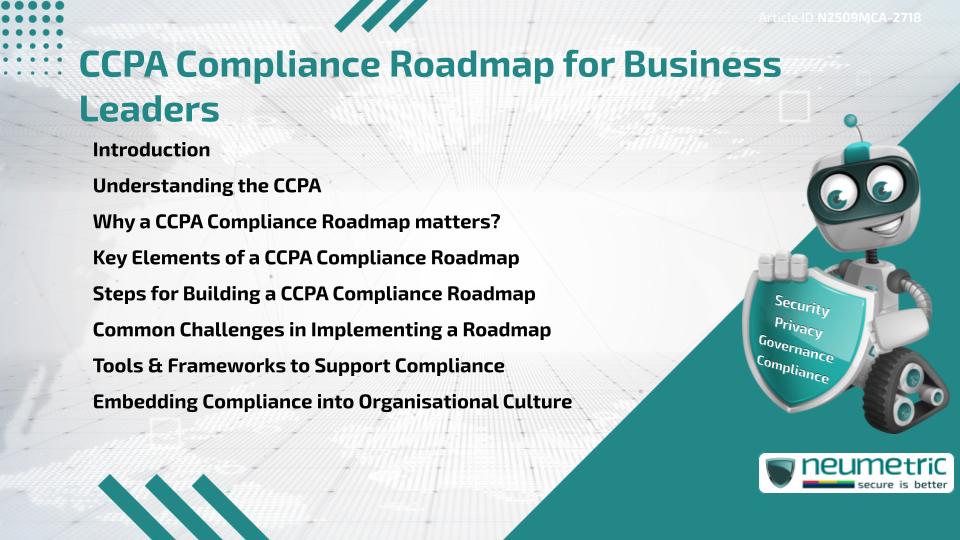Table of Contents
ToggleIntroduction
A CCPA Compliance Roadmap is a structured guide for Organisations to meet the requirements of the California Consumer Privacy Act [CCPA]. It helps Business Leaders navigate obligations such as Data Transparency, Consumer Rights & Vendor Management. A well-designed Roadmap reduces Risks, ensures Compliance & fosters Trust with Consumers. This article explains the importance of a Compliance Roadmap, outlines its key elements, highlights best practices & discusses how Organisations can integrate Compliance into everyday operations.
Understanding the CCPA
The California Consumer Privacy Act [CCPA] grants Consumers rights over their Personal Information. These rights include the ability to know what data is collected, the right to request deletion & the right to opt out of the sale of Personal Data. Businesses covered under the law must establish transparent Policies, update Systems & maintain Accountability for all data practices.
Why a CCPA Compliance Roadmap matters?
Without a CCPA Compliance Roadmap, Organisations Risk Penalties, Reputational damage & Consumer distrust. A Roadmap acts like a GPS, showing clear directions for navigating Regulatory requirements. It transforms complex obligations into actionable steps, helping Leaders allocate Resources, set timelines & monitor progress effectively.
Key Elements of a CCPA Compliance Roadmap
A comprehensive Roadmap includes:
- Data Mapping: Identifying where & how Consumer Data is stored & shared.
- Consumer Rights Management: Establishing procedures to respond to access, deletion & opt-out requests.
- Vendor Risk Management: Ensuring Third Party Partners adhere to CCPA requirements.
- Training & Awareness: Educating staff about Compliance responsibilities.
- Documentation & Reporting: Keeping records of Policies, Practices & Responses.
Steps for Building a CCPA Compliance Roadmap
Business Leaders can follow these steps to create an effective Roadmap:
- Assess Readiness: Review current Policies, Systems & Data handling practices.
- Identify Gaps: Compare existing practices with CCPA requirements.
- Define Objectives: Establish Compliance goals aligned with Business priorities.
- Develop Policies: Draft & implement clear Privacy Policies.
- Implement Tools: Use Compliance Management Software for efficiency.
- Train Employees: Conduct ongoing training for Staff across all levels.
- Monitor & Review: Regularly assess Compliance & adjust as needed.
Common Challenges in Implementing a Roadmap
Many Organisations face hurdles such as complex Vendor Networks, limited Resources & evolving interpretations of CCPA. Overcoming these challenges requires Leadership commitment, Cross-department collaboration & Investment in the right tools.
Tools & Frameworks to Support Compliance
Leaders can leverage tools like Compliance Management Platforms, Automated Consumer Rights request Systems & Monitoring Software. Frameworks such as the National Institute of Standards & Technology [NIST] Cybersecurity Framework also provide valuable guidance for structuring Compliance efforts.
Embedding Compliance into Organisational Culture
A CCPA Compliance Roadmap is most effective when Compliance becomes part of the Organisational culture. Leaders should set the tone by prioritising Privacy, establishing Accountability & rewarding responsible Data Practices. Employees at all levels must understand that Compliance is not only a legal duty but also a means to build lasting Trust with Customers.
Takeaways
- CCPA Compliance Roadmap simplifies complex Legal requirements.
- It helps protect Consumer Data & safeguard Organisational reputation.
- Organisations should assess readiness & address Compliance gaps.
- Training Employees across all levels is essential.
- Leveraging effective tools ensures sustainable Compliance.
FAQ
What is a CCPA Compliance Roadmap?
A CCPA Compliance Roadmap is a structured plan that guides Organisations in meeting the requirements of the California Consumer Privacy Act.
Why do Business Leaders need a CCPA Compliance Roadmap?
It ensures Compliance, avoids Penalties & builds Consumer Trust by turning Regulatory requirements into actionable steps.
What are the main components of a CCPA Compliance Roadmap?
The Roadmap includes Data mapping, Consumer Rights Management, Vendor oversight, Training & Documentation.
How can Organisations overcome challenges in Compliance?
By investing in Tools, encouraging collaboration across Departments & committing Leadership support.
What role does Vendor Management play in the Roadmap?
Vendors must comply with CCPA since they process Consumer Data; oversight ensures accountability & reduces Risks.
How often should a Roadmap be reviewed?
Organisations should review the Roadmap annually & whenever significant Regulatory updates occur.
What Tools help in building a CCPA Compliance Roadmap?
Compliance Management Platforms, Monitoring Systems & Frameworks like NIST help streamline Compliance.
Need help for Security, Privacy, Governance & VAPT?
Neumetric provides Organisations the necessary help to achieve their Cybersecurity, Compliance, Governance, Privacy, Certifications & Pentesting needs.
Organisations & Businesses, specifically those which provide SaaS & AI Solutions in the Fintech, BFSI & other regulated sectors, usually need a Cybersecurity Partner for meeting & maintaining the ongoing Security & Privacy needs & requirements of their Enterprise Clients & Privacy conscious Customers.
SOC 2, ISO 27001, ISO 42001, NIST, HIPAA, HECVAT, EU GDPR are some of the Frameworks that are served by Fusion – a SaaS, multimodular, multitenant, centralised, automated, Cybersecurity & Compliance Management system.
Neumetric also provides Expert Services for technical security which covers VAPT for Web Applications, APIs, iOS & Android Mobile Apps, Security Testing for AWS & other Cloud Environments & Cloud Infrastructure & other similar scopes.
Reach out to us by Email or filling out the Contact Form…


